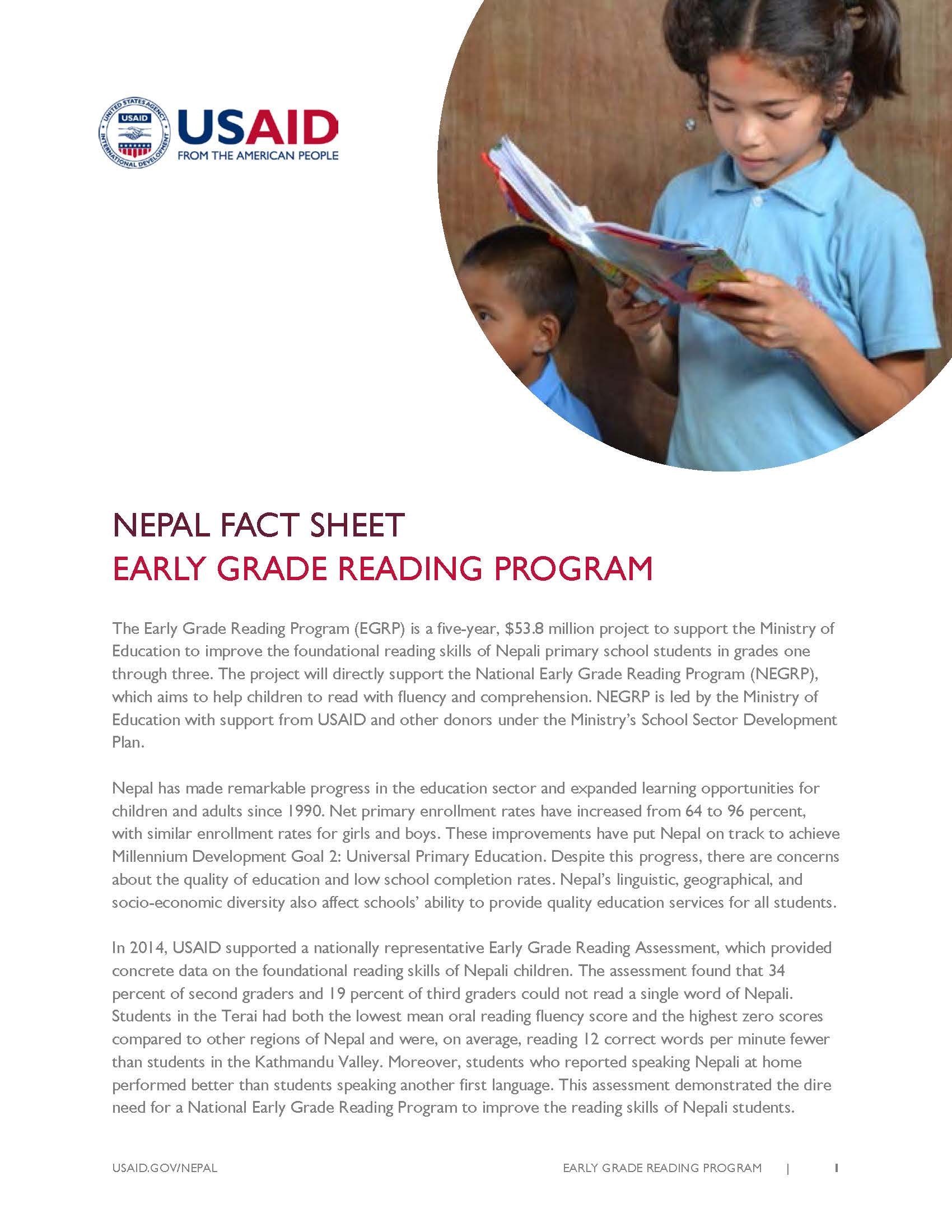The Early Grade Reading Program (EGRP) is a five-year, $53.8 million project to support the Ministry of Education to improve the foundational reading skills of Nepali primary school students in grades one through three. The project will directly support the National Early Grade Reading Program (NEGRP), which aims to help children to read with fluency and comprehension. NEGRP is led by the Ministry of Education with support from USAID and other donors under the Ministry’s School Sector Development Plan.
Fact Sheet : The Early Grade Reading Program (EGRP) ![]() (pdf - 106k)
(pdf - 106k)
Nepal has made remarkable progress in the education sector and expanded learning opportunities for children and adults since 1990. Net primary enrollment rates have increased from 64 to 96 percent, with similar enrollment rates for girls and boys. These improvements have put Nepal on track to achieve Millennium Development Goal 2: Universal Primary Education. Despite this progress, there are concerns about the quality of education and low school completion rates. Nepal’s linguistic, geographical, and socio-economic diversity also affect schools’ ability to provide quality education services for all students.
In 2014, USAID supported a nationally representative Early Grade Reading Assessment, which provided concrete data on the foundational reading skills of Nepali children. The assessment found that 34 percent of second graders and 19 percent of third graders could not read a single word of Nepali. Students in the Terai had both the lowest mean oral reading fluency score and the highest zero scores compared to other regions of Nepal and were, on average, reading 12 correct words per minute fewer than students in the Kathmandu Valley. Moreover, students who reported speaking Nepali at home performed better than students speaking another first language. This assessment demonstrated the dire need for a National Early Grade Reading Program to improve the reading skills of Nepali students.
PROGRAM OBJECTIVES
1: Improved Early Grade Reading Instruction
- Design, produce, and distribute evidence-based early grade reading instructional materials used by teachers.
- Train in-service public school teachers on the use of the provided materials.
- Provide monitoring and coaching in early grade reading instruction for teachers in target districts.
- Improve classroom-based and district-based early grade reading assessment processes.
2: Improved National and District Early Grade Reading Service Delivery
- Improve Ministry of Education’s capacity for early grade reading data collection and analytical systems.
- Institutionalize policies, standards, and benchmarks that support improved early grade reading instruction.
- Improve the planning and management of financial, material, and human resources devoted to early grade reading.
- Adopt national standards for early grade reading improvement and expand those standards geographically.
3: Increased Family and Community Support for Early Grade Reading
- Raise community awareness of the importance of reading and teaching children to read in a language they speak fluently.[1]
- Engage parents and families to support reading in target districts.
- Strengthen capability of parent teacher associations and school management committees to contribute to the quality of reading instruction.
- Strengthen capacity of parents and communities to monitor reading progress in target districts.
EXPECTED OUTCOMES
The Early Grade Reading Program aims to:
- Increase the proportion of grade 1–3 public primary students who can read and understand grade-level text.
- Improve national and district early grade service delivery by completing the design and demonstration of an evidence-based reading model which the Ministry of Education can feasibly replicate and scale up nationally.
- Increase family and community support for early grade reading.
[1] Research overwhelmingly shows that children who learn to read in a language they speak and understand well develop stronger reading skills - in both that language and in additional languages - than children who learn to read in a language they do not speak well (http://pdf.usaid.gov/pdf_docs/Pdacq946.pdf).








Comment
Make a general inquiry or suggest an improvement.